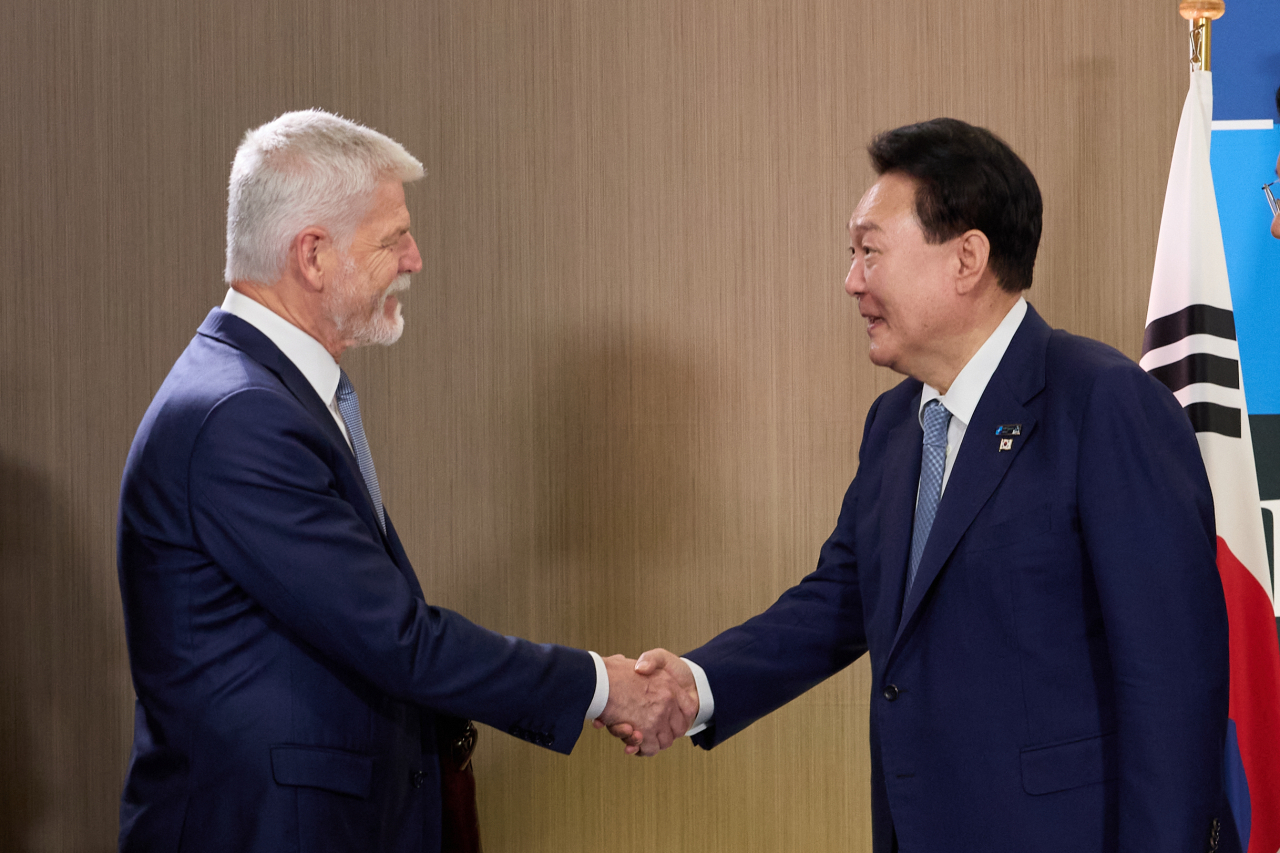
 |
| President Yoon Suk Yeol (right) shakes hands with Czech President Petr Pavel during the bilateral talks in Washington on July 10 on the sidelines of the North Atlantic Treaty Organization Summit. (Pool photo via Yonhap). |
Behind South Korea's win of a 24 trillion won ($17.4 billion) nuclear power plant deal in the Czech Republic was President Yoon Suk Yeol's diplomatic effort, according to local reports quoting his aides in Seoul. Yoon who calls himself "Korea Inc.'s No. 1 salesman" has helped the South Korean consortium inching closer to signing what would be the central European country's largest energy project to build at least two 1,000 megawatts of nuclear units in Dukovany, a city located 170 kilometers southeast of the Czech Republic's capital, Prague, it said.
National policy aide Sung Tae-yoon said Wednesday evening that the president met Czech President Petr Pavel in Washington on the margins of the North Atlantic Treaty Organization summit and sent a private letter to Czech Prime Minister Petr Fiala, whom Yoon first met in June 2022.
It was Czech Prime Minister Fiala Wednesday who announced its decision to select a South Korean consortium -- led by the state-owned Korea Hydro & Nuclear Power -- as the preferred bidder for up to four nuclear units in the Czech Republic.
Also, Yoon had reportedly sent Industry Minister Ahn Duk-geun to the Czech Republic before the announcement.
"In the past couple of months, Ahn served as a special envoy to the Czech Republic and visited there twice," a senior official of the presidential office said on condition of anonymity Thursday. "Ahn explained to his Czech counterparts the South Korean consortium's competitive edge."
The KHNP-led group has won the priority in signing the 24 trillion won construction deal for two nuclear units, as well as the exclusive right to a contract for two more units in Temelin, 100 kilometers south of Prague, if the Czech government approves the project.
Yoon has spearheaded a U-turn from the nuclear phaseout and pledged to lift nuclear power's share in South Korea's energy mix. Under Yoon, nuclear power's share bounced back to the low 30-percent range as of 2022, after being kept below the 30-percent threshold throughout the previous Moon administration, according to data from the World Nuclear Association.
Yoon also openly blasted his predecessor, liberal former President Moon Jae-in, for his nuclear power phaseout policy that cut South Korea's nuclear share of electricity to as low as 23.7 percent in 2018 during his term, as he sought for Korea eventually to become a nuclear-free energy country.
The unnamed official, meanwhile, also pointed to the "competitive pricing, which gave the South Korean group an upper hand."
South Korea has a solid track record in nuclear exports. Three of the four nuclear units in Barakah, United Arab Emirates, which South Korea's consortium built following the signing in 2009, have started commercial operations, while the last one is set to operate beginning later this year.
At the time, the $20 billion megadeal was a boon to then-South Korean President Lee Myung-bak, whose approval rating jumped by over 7 percentage points to 48.1 percent in just a week at the end of December 2009, a Realmeter poll showed.
South Korean companies also won a 3 trillion won bid in 2022 to take part in a project for four 1,200-megawatt-level nuclear reactors in El Dabaa, Egypt, about 300 kilometers northwest of Egyptian capital Cairo.
When asked about whether the ongoing legal dispute between US-based nuclear technology supplier Westinghouse and the KHNP might create a cloud affecting the signing of the contract with the Czech authorities, planned for March 2025, the official said, "It seems the Czech Republic viewed the dispute as unproblematic given South Korea's amicable relationship with the United States."









